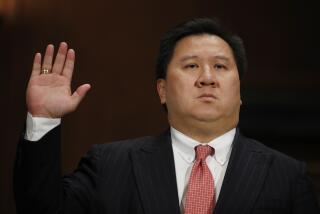Botox Not Cause of Illnesses, Jury Says
- Share via
After a colorful trial that pitted a Hollywood socialite against her longtime celebrity dermatologist, a Los Angeles jury ruled that the Botox treatments she took for migraine headaches did not cause myriad illnesses or the four-month migraine she blamed on the wrinkle cure.
Irena Medavoy, 45, said she suffered the symptoms after Beverly Hills dermatologist Arnold Klein gave her a series of injections of the drug in 2001 and 2002 without warning her that Botox may cause “life-altering headaches.”
The high-profile case included testimony from other socialites, Vanna White and a who’s who in specialty medicine. Some testimony focused on former model Medavoy’s two TV projects, both with provocative titles: “Behind the Gates” and “Trophy Wives,” which included a plot line featuring a woman who fakes an illness to get attention.
After a five-week trial in Los Angeles County Superior Court, the jury voted 9 to 3 against her.
With husband Mike Medavoy, co-founder of Orion Pictures and former chairman of Tri-Star Pictures, at her side, Irena Medavoy said she will appeal the decision and continue her fight to show that Allergan misled the public about Botox’s safety.
She said the defense attorneys had unfairly kept the focus on her lifestyle -- the fact that she went to star-studded parties when she said she was bedridden -- and not on the seriousness of her ordeal.
“It’s been such a long road,” she told reporters. “Maybe a non-Hollywood person suing a non-Hollywood doctor won’t get this kind of dirt thrown at them.”
Medavoy filed the medical malpractice suit in January 2003, accusing Klein of negligence. Her lawsuit also accused Botox manufacturer Allergan Inc. of product liability and falsely advertising the drug by misleading the public on its risks. But Superior Court Judge Victor Chavez dismissed the latter claim Friday morning.
Medavoy asked for $192,000 for medical bills and lost wages from a proposed talk show, and she left it up to the jury to determine compensation for pain and suffering. She blamed a monthslong migraine in 2002 on the drug, which, ironically, Klein used to treat the migraines she had suffered for years, although it is not FDA-approved for that. She said Klein failed to warn her that the drug may cause “life-altering headaches,” primarily because he was a paid consultant to Allergan.
Klein and Allergan said the symptoms that Medavoy claims were Botox-related had plagued her years before she had ever used the drug, and that dozens of studies had proved it was safe in much higher doses than were used to treat her migraines.
The trial included weeks of medical testimony from about 20 doctors, three of whom blamed Botox for Medavoy’s symptoms, including all-over body pain, respiratory problems and fatigue. Several others diagnosed Medavoy with fibromyalgia, a painful musculoskeletal condition with no known cause.
The jury began deliberating on Wednesday, but on Friday morning asked the judge to replace one of its members. The court granted their request without offering an explanation. At 9:30 a.m., the jury began deliberating anew. A verdict was reached in about three hours.
Juror Ronald Jahn said the man who was removed had suffered from fibromyalgia and “he didn’t even want to consider any of the expert testimony. He said they were all lying.”
Medavoy’s attorney, Jeff Benice, said, “But for the removal of that juror, it would have been a mistrial.”
In the end, nine jurors didn’t believe Medavoy’s doctors, Jahn said. “We tried to go through it very logically,” he said. “Three national experts said the same thing, that there was zero connection, and the product insert said there were more headaches in placebo [injected] patients than in Botox patients. As far as general cause was concerned, we really didn’t have a case there at all.”
Allergan’s attorneys, Hoot Gibson and Ellen Darling, could hardly contain their joy as they waited their turn before the cameras -- perhaps because Botox is in the second of three phases of Federal Drug Administration trials to determine whether it should be approved as a migraine treatment.
Klein was not present for the verdict, but his attorneys, Howard Weitzman and Stephen Fraser, said he was “very grateful” for the decision and “looking forward to returning to his practice” without distraction.
In a statement, the Medavoys reaffirmed their original intent. “We brought this lawsuit because we felt people should know there can be risks associated with the off-label use of prescription drugs and that the doctors we trust sometimes have financial relationships with drug companies that need to be disclosed. Win or lose, that message is getting out, which in the end is what really matters to us.”
More to Read
Inside the business of entertainment
The Wide Shot brings you news, analysis and insights on everything from streaming wars to production — and what it all means for the future.
You may occasionally receive promotional content from the Los Angeles Times.










